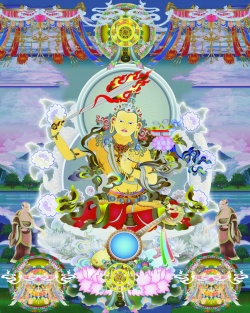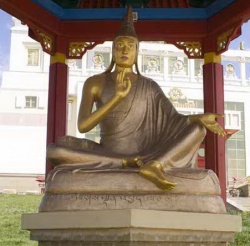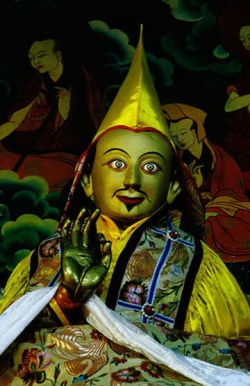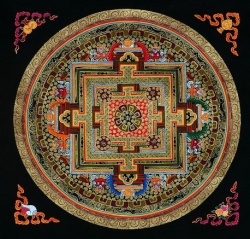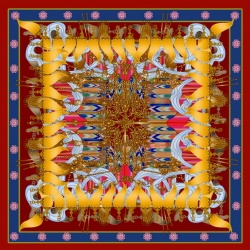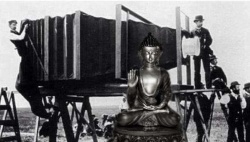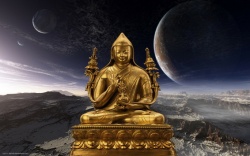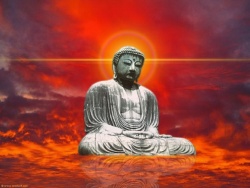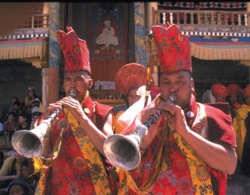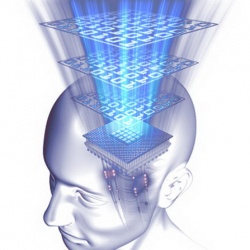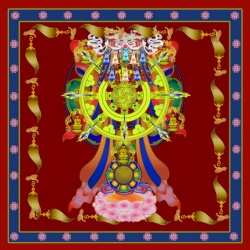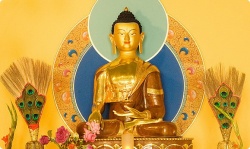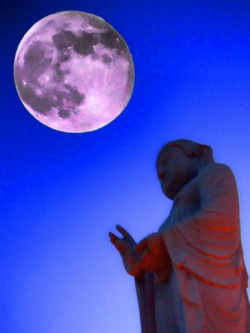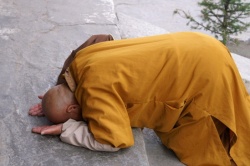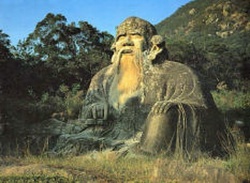Nirvana Sutra: Chapter Thirteen: On Letters
Mahayana Mahaparinirvana Sutra
Translated by KOSHO YAMAMOTO
FROM Dharmakshema's Chinese version
The World's genuinely first-ever web edition of this complete scripture
(This "Yamamoto/page edition" is Copyright of Dr. Tony Page, 2004 )
The Complete Kosho Yamamoto English Translation of the "Nirvana Sutra", edited and revised by Dr. Tony Page, typographically improved by Jay and Gabriele Mazo
Chapter Thirteen: On Letters
“The Buddha said to Bodhisattva Kasyapa: "All such different opinions, fortune-telling, language, and letters are what the Buddha spoke and not what was said by tirthikas." Bodhisattva Kasyapa said to the Buddha: "O World-Honoured One! How do you, the Tathagata, tell (of) the root concept of letters?" The Buddha said: "O good man! First, the half-letter (i.e. the phonic alphabet of Sanskrit) is taught and is made the root-concept. This holds good for all written things, fortune-telling, sentences, all elements and realities. Common mortals learn the foundation of letters. Later, they come to know what is right and what is not."
Bodhisattva Kasyapa said to the Buddha: "O World-Honoured One! What is the meaning of the letter?" "O good man! It stands on fourteen phonic bases, which constitute the meanings. The so-called letter is Nirvana. Being Eternal, it does not flow away. What does not flow away knows no end. What knows no end is the Adamantine Body of the Tathagata. These fourteen constitute the foundation of letters.
"A" is so called because it does not get destroyed. What is indestructible is the Three Treasures. For example, this is like the diamond. It is also so called because it does not flow away. What does not flow away is the Tathagata. In the nine holes (i.e. outlets of the body: two eyes, two ears, two nostrils, mouth, two outlets for excretion) of the Tathagata, there is nothing that flows away. So, it is the unflowing (“anasrava” - non-defilement). And there are nine holes. Hence, it is "non-flowing". Non-flowing is the Eternal; the Eternal is the Tathagata. The Tathagata is not that which has been created. Hence, he is non-flowing. Also, "a" is virtue. Virtue is the Three Treasures. For this reason, we say "a".
"Next, "ã" stands for "ãcãrya". What does "ãcãrya" mean? In worldly life, we can call him a "holy person". Why do we say "holy person"? "Holy" means "non-attached". It means "of little desire" and "feeling contented". Also, it is called "pure". It thoroughly passes beings across the great sea of the three worlds of birth and death. That is why we say "holy".
"Also, "ã" means "institution" (implementation), which is to act in accordance with the pure precepts and observe deportment.
"Also, "ã" means to depend upon a holy person. This is to learn his comings and goings and all that he does. The three holy ones are given offerings, respected and worshipped. One faithfully serves one's parents and studies the Mahayana. Good men and women uphold the prohibitions. And all Bodhisattvas are called "holy ones". "á" also means "order". It says: "Come and do this; you should not do it like that." So do things go. One who checks and suppresses non-deportment is a holy one. That is why we say "ã".
"I" is the Buddhist teaching. Pure action is extensive, pure and untainted. It is, for example, like the full moon. "Do thus, not like that; this is right, that is not right; this is a sermon of the Buddha, and this is what Mara says. "Hence, we say "i".
"We say "ã". The meaning of the Buddhist teaching is wonderful and profound. It is as when we call the laws (dharmas) of Mahesvara and Brahma unmolested (unlimited). Well upheld, it (Buddhist teaching) is the protection of Dharma.
"Also, unmolestedness (unlimitedness, unrestrictedness) is called the four protections of the world. As these four are unmolested, one well takes in and protects the Great Nirvana Sutra, and one unmolestedly expounds and disseminates (it).
"Also, next, "ã" stands for the unmolested (unhindered, unstinting) dissemination of Dharma to beings.
"Also, next, "ã"is the unmolested (unconstrained). It asks and says what is right. This is nothing other than the learning of the vaipulya sutras.
"Also, next, "ã" stands for the crushing out of jealousy. When the barnyard grass has been thoroughly weeded out, everything changes into what is auspicious. So we say "ã".
"U" stands for Great Nirvana, the Highest, the most superb, the pinnacle of pinnacles of all sutras.
"Also, next, "u" stands for the nature of the Tathagata, which no sravakas and pratyekabuddhas hear about. This is like Uttarakuru being the best of all places. If any Bodhisattva indeed hears this sutra, he is the highest and most superb. Hence, we say "u".
"â" is, for example, like cow's milk, which is the best of all tastes. The nature of the Tathagata is also like that. Of all sutras, this is the holiest and best. Anyone who slanders (it) is none but a cow.
"Also, next, "ä" is called "not-wise". A person thoroughly slanders the delicate and hidden storehouse of the Tathagata. Know that this person is most to be pitied. Parting from the hidden storehouse of the Tathagata, he speaks about no-Self. Henc, we say "ä".
"E" is the “Dharmata” and Nirvana of all Buddhas. Hence, we say "e".
"Ai" means "Tathagata".
"Also, "ai" refers to the goings and comings, bendings and stretchings, and the deeds of the Tathagata, by which not one amongst all beings is (not) benefited. Hence, "ai".
"O" stands for illusion; illusion is "asrava" (defilement). The Tathagata is eternally free from illusion. Hence, "o".
"Au" means Mahayana. It stands for the utmost of all the fourteen sounds. The case of the Mahayana sutras is also like this. They are the ultimate of all sutras and shastras. Hence, "au".
"Am" makes away with all impurities. In the Buddhist teachings, all gold, silver and treasures are abandoned. Hence, "am".
"Ah" means "superb vehicle". Why? This Mahayana sutra, this Great Nirvana Sutra, is the most superlative of all sutras. Hence, "ah".
"Ka" calls forth great compassion towards all beings. The thought of a son arises, as towards Rahula. It means "wonderfully good". Hence, "ka".
"Kha" stands for "non-good friend". "Non-good friend" means mixed and defiled. He does not believe in the hidden store of the Tathagata. Hence, "kha".
"Ga" means "store". "Store" means the undisclosed store of the Tathagata. All beings have the Buddha-Nature. Hence, "ga".
"Gha" is the eternal sound of the Tathagata. What is the eternal sound of the Tathagata? The so-called Tathagata is eternal and does not suffer change. Hence, "gha".
"Na" represents the breaking (destructible, impermanent) characterstics of all beings. Hence, "na".
"Ca" means "to practise". As it subdues all beings, we say "practise".
"Cha" means "Tathagata", who houses (shades, protects) all beings, as in the case of a great parasol. Hence, "cha".
"Ja" means "right (true) emancipation". There arises (in this) no ageing. Hence, "ja".
"Jha" stands for the great proliferation of defilements, as in the case of a great forest. Hence, "jha".
"Na" means "Wisdom". It means true “Dharmata”. Hence, "na".
"Ta" signifies speech delivered about dharmas in Jambudvipa, showing a half-body, as in the case of the half-moon. Hence, "ta".
"Tha" represents the perfection of the Dharma-Body, as in the case of the full moon. Hence, "tha".
"Da" represents an ignorant bhiksu who does not know the Eternal and the non-Eternal, as in the case of a child. Hence, "da".
"Dha" represents a person who feels no obligation towards his teacher, as in the case of a ram. Hence, "dha".
"Na" represents lack of knowledge of the meaning of what is holy, as in the case of a tirthika. Hence, "na".
"Ta" represents the Tathagata, who says to all bhiksus: "Come away from fright and fear. I shall now deliver sermons on Wonderful Dharma." Hence, "ta".
"Tha" means "ignorance". Beings repeat birth and death and bind themselves, as in the case of a silkworm or dung-beetle. Hence, "tha".
"Da" means "great giving". This is the so-called Mahayana. Hence, "da".
"Dha" praises "virtue". It is as in the case of the Three Treasures, which are like Mount Sumeru, soaring up, grand, extensive and, yet, not inclining to one side. Hence, "dha".
"Na" alludes to the Three Treasures, which stand peacefully rooted, not inclining to one side or moving, like the threshold of a gate. Hence, "na".
"Pa" means "inverted". If a person says that the Three Treasures expire, this shows that that person himself entertains doubt. Hence, "pa".
"Pha" refers to the ill-fortune of the world. If a person says that when ill-fortune arises in the world, the Three Treasures also expire, this indicates that that person is ignorant, that he has no knowledge, and that he acts against the holy will. Hence, "pha".
"Ba" refers to the ten powers of the Buddha. Hence, "ba".
"Bha" refers to the shouldering of what is heavy. It can stand bearing the heaviness of Wonderful Dharma. Know that such a person is a great Bodhisattva. Hence, "bha".
"Ma" refers to all Bodhisattvas who strictly uphold all the institutions (rules). This is so-called Mahayana Mahaparinirvana. Hence, "ma".
"Ya" alludes to all those Bodhisattvas who, for the benefit of beings, preach the Mahayana doctrine in all places. Hence, "ya".
"Ra" crushes out greed, anger and ignorance, and disseminates Wonderful Dharma. Hence, "ra".
"La" relates to the sravaka vehicle, which moves, changes, and has no place to live in (i.e. no permanent abode). Mahayana is safe and firm and there is no inclining or moving (with it). Abandoning the sravaka vehicle, one makes effort and practises the unsurpassed Mahayana. Hence, "la".
"Va" means that the World-Honoured One is he who showers down upon all beings the great rain of the Dharma. He is, as it were, a so-called fortune-telling sutra. Hence, "va".
"â" means to part from the three arrows (the three barbs of greed, malevolence and ignorance). Hence, "ä".
"Sa" means "perfection". If one truly hears this Great Nirvana Sutra, one already hears and upholds all about Mahayana sutras. Hence, "sa".
"Sa" means that Wonderful Dharma is expounded to all beings, so that people feel blessed. Hence, "sa".
"Ha" bespeaks the mind's state of gladness. How wonderful is it that the World-Honoured One departs from all actions; strange is it that the Tathagata enters Parinirvana. Hence, "ha".
"Lham" signifies "Mara". Innumerable Maras are unable to destroy the hidden storehouse of the Tathagata. Hence, "lham".
"Also, further, 'lham' signifies that one lives in accordance with what obtains in the world and parents, wife and children. Hence 'lham'.
"The four letters, r,r, l, l, have four meanings. These are Buddha, Dharma, Sangha, and Abhidharma. Abhidharma relates to what obtains in the world. It shows that Devadatta destroys the Sangha. He transforms himself into various forms, faces and concrete forms. The case is like this. All this is to establish vinaya. The wise should clearly see through this and not entertain any fear. This is following what obtains in the world. Hence, r,r,l,l.
"The inhalation of breath is the sound which one gets when the tongue accords with the nose. We gain the meaning by the long, short, or the one that supercedes the sound. All differ according to the actions of tongue and teeth.
"All such meanings of the letters well enable beings to purify their verbal actions. The Buddha-Nature of beings does not first become pure when assisted by letters. Why not? Because that nature is originally pure. Also, while co-existing with the five skandhas, the 18 realms and the 12 spheres (of the senses), the Buddha-Nature is not one with the five skandhas, the 18 realms and the 12 spheres. Because of this, all beings should take refuge in the Bodhisattvas and others. Because of the (existence of the) Buddha-Nature (within them), beings are viewed with equal (non-discriminating) eyes, and there is no difference. Hence, the half-letters form the basis of all sutras, all written material, and sentences.
"Also, the meaning of the half-letters refers to the root of all defilements. So they are called half-letters. The full letters are the root of all good dharmas and speech. For example, those of the world who do evil are called half-letters, and those who do good full-letters. Thus, all sutras and the Abhidharmas are based upon the half-letters. People may say that the Tathagata and true emancipation fall under the category of the half-letters. But this is not so. Why not? Because these (two) part from (i.e. are separate from) letters. Because of this, the Tathagata is unmolested (unconstrained), unattached, and fully emancipated in all things. How do we arrive at the meaning of the letters? If one comes to think that the Tathagata appears in the world and does away with the half-letters, this is understanding the meaning of the letters. Any person who follows the meaning of the half-letters is one who does not know the nature of the Tathagata. What is the the meaning of the letterless? One who associates with those who practise the teaching of evil belongs to the letterless. Also, although a person may associate with those who do good, if he does not know the difference between the Eternal and the non-Eternal, the constant and the non-constant of the Tathagata, and the two Treasures of Dharma and Sangha, between vinaya and non-vinaya, sutras and non-sutras, the words of Mara and those of the Buddha, such a person is one who is letterless. This do I state regarding how one is letterless. O good man! For this reason, you should part from the half-letter and arrive at the meaning of the complete letters."
Bodhisattva Kasyapa said to the Buddha: "O World-Honoured One! I shall now thoroughly learn the number of letters. I have encountered the unsurpassed teacher. I have now received the kindly injunctions of the Tathagata."
The Buddha praised Kasyapa and said: "Well said, well said. A person who is intent upon Wonderful Dharma should learn things thus."
Chapter Fourteen: On the Parable of the Birds
“The Buddha said further to Kasyapa: "O good man! There are two species of birds, one the kacalindikaka and the other the mandarin duck. In playing or stopping (resting), they always act together; they do not separate. The same is the case with suffering, the non-eternal, and non-Self. They do not separate."
Bodhisattva Kasyapa said to the Buddha: "O World-Honoured One! In what way do things obtain with suffering, the non-eternal, and non-Self as with the mandarin duck and the kacalindikaka?" The Buddha said: "O good man! What is contrary to Dharma is suffering, and what is contrary to Dharma is bliss. What is contrary to Dharma is the eternal and what is contrary to Dharma is the non-eternal. What is contrary to Dharma is self and what is contrary to Dharma is non-Self. For example, it is as in the case in which rice differes from hemp and wheat, and hemp and wheat from beans, millet and sugar cane. With all of these, the non-eternal are the buds, flowers and leaves. When the fruit ripens and when man uses it, we say eternal. Why? Because the nature is true."
Kasyapa said to the Buddha: "O World-Honoured One! If these are eternal, are they equal to the Tathagata?" "O good man! Do not speak in such a way. Why not? If one says that the Tathagata is like Mount Sumeru, does this imply that he will break up, as Sumeru must break up when the time comes for it to disintegrate? O good man! Do not view things thus. O good man! “With all things, excepting Nirvana, not one thing is eternal”. Merely to conform with the ways of secular truth, we say that the fruit is eternal." Bodhisattva Kasyapa said to the Buddha: "O World-Honoured One! It is good, it is good. It is as the Buddha says." The Buddha said to Kasyapa: "It is thus, it is thus, O good man! A person may be true to what the sutras say or may have practised all the samadhis, but until he has learned Mahaparinirvana, he will say that all is non-eternal. When a person has learned this sutra, he may have illusion, but he is, so to speak, without illusion. It (learning this sutra) well benefits man and heaven Why? Because “one clearly sees that one's own body has the Buddha Nature within. This is the Eternal.”
"Also, next, O good man! It is like the case of the mango tree. When its flower first appears, what there is (at that time) is the changing phase. When it bears fruit and when it bestows much benefit, we speak of the eternal. O good man! A person may thus be true to all the sutras or may have practised samadhis, but when he has not yet given ear to this Great Nirvana Sutra, all is based on the non-eternal. When a person gives ear to this sutra, although (still) possessing illusion, it is as though he had no illusion. That is to say that it benefits both man and heaven. How? Because that person clearly knows that he has the Buddha-Nature within. This is the Eternal.
"Also, next, O good man! When an ingot of gold melts, this is the phase of the non-eternal. Once molten, it becomes gold. When it greatly benefits a person, we say eternal. The case is like this. Thus, O good man, a person may be true to all sutras or may have practised all samadhis, but if he has not yet given ear to this Great Nirvana Sutra, all is non-eternal. When a person has given ear to this sutra, he may well have illusion, but it is as though he did not. It thus benefits all men and gods. Why? Because the person clearly comes to know that he has the Buddha-Nature within. This is the Eternal.
"Also, next, O good man! Sesame, for example, when not yet pressed, is non-eternal. Once the pressing has been done and the oil has been extracted, the sesame gives great benefit. This is the eternal. O good man! A person may be true to all sutras or may have practised samadhis, but not yet having heard of Great Nirvana, all is non-eternal (for that person). Having heard this sutra, though yet bound by illusion, a person is equal (equivalent) to possessing no illusion. Benefits accrue to any human or god. Why? Because that person realises that he has the Buddha-Nature within him. This is the Eternal.
"Also, next, O good man! It is as in the case in which all rivers drain into the sea. All sutras and samadhis flow into the Mahayana Great Nirvana Sutra. How so? Because it ultimately expounds the Buddha-Nature. That is why I say: "Some dharmas are eternal; some dharmas are non-eternal. With non-Self, too, things amount to the same." It is thus that I say.
Bodhisattva Kasyapa said to the Buddha: "O World-Honoured One! The Tathagata is already segregated from the poisonous arrows of apprehension and suffering. Apprehension and suffering are heaven (devas); the Tathagata is no heaven (deva). Apprehension and suffering are human; the Tathagata is no human. Apprehension and suffering are the 25 existences. Hence, there can exist no apprehension or suffering with the Tathagata. How could one say that the Tathagata is apprehension and suffering?" "O good man! In No-Thought Heaven (“avrha”), what obtains is thoughtlessness. If thoughtless, there can be no life. If there is no life, how can there be the five skandhas, the 18 realms and twelve spheres? Hence, we cannot say that the life of No-Thought Heaven has any place to exist. O good man! For example, the god of a tree lives in the tree. We cannot definitely say that he lives in the branch, the knot, the trunk, or the leaf. Though we cannot name the place, we cannot say that he does not exist. The life of No-Thought Heaven is also like that. O good man! The case of Buddha-Dharma is likewise thus. It is very deep and unfathomable. The Tathagata has no apprehension, suffering or worry. Yet, he evinces great compassion towards beings, has apprehension and sorrow, and views them as he views Rahula.
"Also, next, the life of No-Thought Heaven can only be known by the Buddha. It is beyond the ken of others. Also, the same applies to Thoughtlessness-non-Thoughtlessness Heaven. O Kasyapa! The nature of the Tathagata is pure and untainted, and is like a transformed body. How can there be any apprehension, suffering or worry? If the Tathagata has no apprehension or suffering, how can he bestow benefit upon beings and disseminate the Buddhist teaching? If "no", how can we say that he sees beings as he sees Rahula? If he does not see beings as he sees his Rahula, any such statement can only be false. Hence, O good man, the Buddha is inconceivable, Dharma is inconceivable, the nature of beings is inconceivable, and the life of No-Thought Heaven is inconceivable. Whether the Tathagata has any apprehension or not is for the world of the Buddha (to know). It is not what sravakas or pratyekabuddhas can fathom out.
"O good man! For example, a house cannot stand in the air as it is for a moment. If one says that a house cannot remain in the air, this is not something that can be said. For this reason, one should not say: "A house in the air can stand or not." A common mortal may say that a house stands in the air. But there is no place in the air where it can remain. Why not? Because, by nature, it has no place to stay. O good man! The same is the case with the mind. Do not say that its abode is in the five skandhas, the 18 realms, or the 12 spheres. The same with the life of No-Thought Heaven. Regarding any apprehension and sorrow of the Tathagata it is also like this. If he has no apprehension and sorrow, how can we say that he views (all beings) with an all-equal eye, as though viewing Rahula? A person might well say that he has (apprehension and sorrow), yet how (then) can one say that his nature is like the Void?
"O good man! As an example: a magician may conjure up such diverse things as a palace, killing, long life, binding or undoing, gold, silver, beryl, treasures, forests, and trees. But these have no place where they exist. The same with the Tathagata. Following the way of the world, he displays apprehension and sorrow. There can be (in actuality) no such forms (i.e. no such things as these with him). O good man! The Tathagata has already entered Parinirvana. How could there be any apprehension, sorrow, or worry? Now the Tathagata enters Nirvana. If anyone says that this is the non-eternal, know that this person has apprehension and sorrow. No one can truly know whether the Tathagata has apprehension or not.
"Also, next, O good man! As an example: a person who lives in a low social sphere can certainly know what obtains in the lower sphere of life. But he cannot know what obtains in the middle or upper spheres of life. A person of the middle sphere knows what obtains in the middle sphere, but not in the upper. A person of the upper sphere knows about that upper sphere, but not about the middle or lower spheres. It is the same with sravakas and pratyekabuddhas. Likewise, a person only knows what is of his own sphere. It is not thus with the Tathagata. He knows his own sphere, as well as those of others. That is why we say that the Tathagata is unhindered. He manifests phantoms and follows the ways of the world. The fleshly eyes of common mortals see this. They say that it is true. They may desire to know the unhindered and unsurpassed Wisdom of the Tathagata, but this never comes about. Only the Buddha knows what is apprehension and what is not. Hence, different things possess the Self and different things do not possess the Self. This is what we mean when we say that things obtain as in the case of the mandarin duck and the kacalindikaka.
"Also, next, O good man! The Buddhist teaching is like the mandarin duck (and kacalindikaka) who go about together. The mandarin duck and the kacalindikaka seek out uplands in midsummer when the water is high and deposit their young there. This is to bring raise them. Later, they play as they originaly ought to. The same with the appearance of the Tathagata. He teaches innumerable beings and enables them to abide in Wonderful Dharma. This is like the mandarin duck and the kacalindikaka seeking out uplands and safely depositing their young ones there. The same with the Tathagata. He enables beings to act as they ought to act and enables them to enter Mahaparinirvana. O good man! That is to say that suffering is one teaching (dharma) and bliss is a different one (dharma). All created things are sorrow; Nirvana is Bliss. It is most wonderful and destroys created things (i.e. lifts one beyond the created sphere)."
Bodhisattva Kasyapa said to the Buddha: "O World-Honoured One! How do beings attain Nirvana and gain the pre-eminent Bliss?" The Buddha said: "O good man! As stated, the fusion of composites is age-and-death.
"If strict in one's way of life and not indolent,
This is amrta (the deathless, ambrosia).
To be indolent and not strict
In one's way of life is death.
Non-indolence gains one the deathless place;
Indolence always leads one to death."
"Indolence is of the created, the foremost of suffering. Non-indolence is Nirvana, the foremost of amrta and Bliss. The created is a place of death, the foremost of suffering. Nirvana is deathlessness, the most wonderful Bliss. Indolence calls in (i.e. is generative of) the created. This too is spoken of: eternal Bliss, deathlessness, and the Body Indestructible. What is indolence and what is not? The unholy common mortal (i.e. a tirthika) is of indolence and eternal death; the world-fleeing holy one (“shramana”) belongs to the class of non-indolence, in whom age-and-death has no abode. Why not? He gains the foremost of eternal Bliss and Nirvana. The holy persons of the supramundane stage have no indolence and there exists (for them) no age-and-death. Why not? They enter into the foremost stage of eternal Nirvana. Hence, Suffering and Bliss are two different things; Self and non-Self are two different things.
"A man stands on the ground and looks up at the sky, where he can see no trace of where the birds have flown. The same is the case (here). O good man! The same is the case with beings. They do not possess the heavenly eye. Immersed in illusion, they cannot see the nature of the Tathagata, which they possess. For this reason, I now expound the (hitherto) undisclosed teaching on selflessness. Why? “A person who lacks the heavenly eye does not know the True Self”. Because he estimates Self in the wrong way. All things created by illusion are non-eternal. That is why I say that the Eternal and the non-Eternal are two different things.
"If one with effort and courage
Gains the summit of a mountain,
One sees the plains, the expanse of the fields and all beings.
As one gains the great palace of Wisdom
And the seat that is topless (topmost) and wonderful,
One already makes away with apprehension and suffering
And sees the apprehension of beings.
"The Tathagata cuts off innumerable illusions, lives in the mountain of Wisdom, and sees beings who live amidst innumerable billions of illusions."
Bodhisattva Kasyapa said to the Buddha: "O World-Honoured One! Things are not as stated in the gatha. Why not? One who enters Nirvana has no apprehension or joy. How can such a person gain the palace of Wisdom? Moreover, living on the summit of the mountain, how can one see beings?"
The Buddha said: "O good man! The palace of Wisdom is Nirvana. The person with no apprehension is the Tathagata; the person who has apprehension is the common mortal. The common mortal has apprehension and the Tathagata has not. The summit of Mount Sumeru is true emancipation. One who incessantly makes effort is like Mount Sumeru, which knows of no shaking. The earth is a thing created. All common mortals live peacefully on the earth and do all (manner of) things. Wisdom is true Awakening. A person away from existence is one eternal. This is the Tathagata. The Tathagata has pity for the innumerable beings who are exposed to the poisonous arrows of all existences. That is why we say that the Tathagata has apprehension."
Bodhisattva Kasyapa said to the Buddha: "O World-Honoured One! If the Tathagata has apprehension and sorrow, he could not be the All-Enlightened One." The Buddha said to Kasyapa: "All depends on the circumstances. As he sees that his presence is called for to save beings, the Tathagata manifests himself. Though manifesting himself in life, there is yet (here) truly no life. That is why we call the Tathagata one who is Eternal. The case is like that of the kacalindikaka and the mandarin duck."

